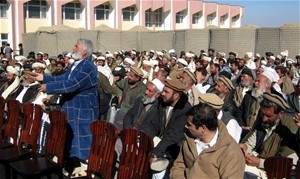Home » Reports & Data » Progress » Transforming Lives » Afghans Form First District Community Council

Representatives from Kushi district make their concerns known to the Afghan Government.
USAID/ASOP
USAID supports the creation of a community council in Kushi district, Logar province.
3 JANUARY 2010 | LOGAR PROVINCE, AFGHANISTAN
Afghan-led, community-oriented development is essential to building a well-governed, democratic country that meets the needs of its citizens. USAID and the Afghan Independent Directorate of Local Governance are helping Afghans take ownership of their own local governance and development priorities through the creation of community councils. These councils improve community coordination and communication with the Afghan government on issues such as security, corruption, and development.
On December 6, 2009, more than 400 people from Khushi district in Logar province traveled in cold weather, some up to 50 kilometers, to participate in a meeting to create their district community council. These participants included community leaders, religious leaders, elders, village representatives, the district governor, district officials, teachers, school principals, and other stakeholders. The Khushi Community Council is the first of 18 councils to be created in three provinces under USAID’s Afghanistan Social Outreach Program.
The council creation process was difficult and required a great deal of careful negotiation and compromise. With a population of approximately 25,000 in 83 villages, Khushi had been divided into four geographic zones during the reign of King Zaher Shah. However, the Tajik population of the community challenged this geographical division and emphasized that it does not represent the current ethnic composition of the district. After the intervention of the governor, participants agreed to divide the districts into five zones, two for Pashtuns and three for Tajiks, to elect nine council members from each group.
The election process was conducted through a jirga – one of the oldest and most respected traditions of Afghan and Islamic culture – during which members were elected by consensus. Two of the groups submitted their lists of elected members the same day, while the other groups deliberated for a few days. Once elected, council members were handed a great responsibility by their communities, and will honor that responsibility by communicating the needs of their constituents to the Afghan Government.







Comment
Make a general inquiry or suggest an improvement.